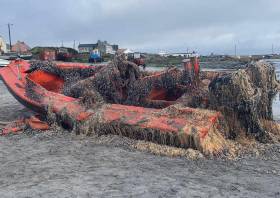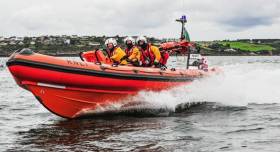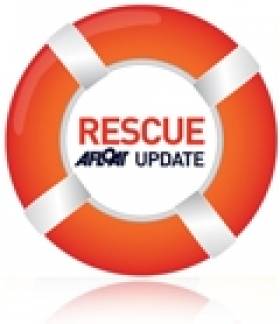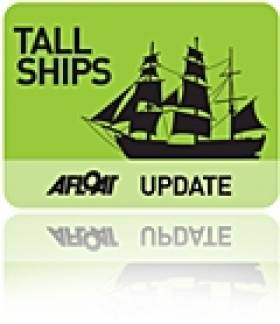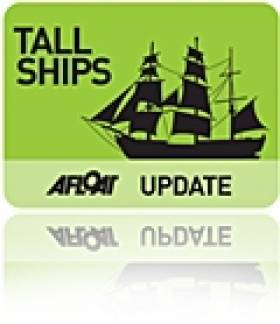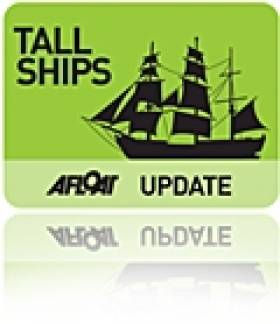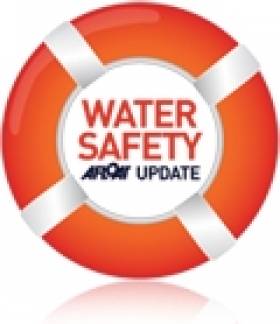Displaying items by tag: US Coast Guard
US ‘Rescue Boat’ Found Near Aran Islands Causes A Stir
An apparent coastguard vessel from the United States has washed up in the Aran Islands today (Tuesday 3 September).
In a post on their Facebook page, the Doolin Ferry Company reported spotting an object in the water on the way to Inis Oírr that turned out to be an upturned boat.
With the help of a local fishing boat and a number of islanders, the red boat was brought onto the beach and investigated for clues — the biggest being its serial number.
That identified the vessel as “Fast Military Rescue Boat”.
It’s not yet clear how long the boat has been in the water, and how it came to drift to Ireland’s shores.
But the ferry company’s appeal for more information has potentially identified it as boat built in 2015 for use in gunnery training by the US Navy.
David K Hunt of Alabama-based Silver Ships says the vessel is a “foam collar boat” used for target practice.
“We do air collar boats that are intended to sink, not float to Ireland,” he added.
#RNLI - Crosshaven RNLI launched to reports of a man overboard from a visiting US Coast Guard cutter off Cork Harbour yesterday morning (Tuesday 24 May).
According to the station's Facebook page, the Crosshaven lifeboat was tasked alongside the local Irish Coast Guard unit and the Waterford-based coastguard helicopter Rescue 117 after the crewman fell overboard from the vessel conformed by gCaptain as the sail training barque Eagle.
However the operation was stood down shortly after launch as the tall ship mounted its own successful rescue of the casualty.
Eagle, which previously visited Irish waters in 2011, is expected in Dublin later this week before sailing to Britain and Portugal next month.
Search Ends for Missing Sailors in San Francisco Yacht Tragedy
#MISSING SAILORS - The US Coast Guard last night suspended its search for four yacht crew members - including two Irish sailors - who went missing after what's being described as San Francisco's worst ever sailing accident, Fox News reports.
Petty Officer Caleb Critchfield told the Associated Press: "There's a window of survivability and we searched well beyond that window."
Boats and aircraft had combed over 5,000 square miles of ocean in a marathon 30-hour operation before the search was halted at sunset last night. It is not expected to resume.
As previously reported on Afloat.ie, the missing include Irish yachtsmen Alan Cahill, originally from Blarney in Co Cork, and his friend Elmer Morrissey, who had moved to the US for work only last year, according to friends and colleagues on Facebook.
The two men, along with fellow crew Jordan Fromm, Alexis Busch and Marc Kasanin, were thrown into the frigid water after their 38-foot yacht Low Speed Chase ran aground at the Farallon Islands, some 25 miles off the coast of San Francisco in northern California.
Three other crewmembers, including the boat's owner and skipper James Bradford, were rescued from the rocks shortly after the incident. The body of Kasanin, 45, was recovered from the water hours later.
The boat had been competing in the Full Crew Farallones Race with 40 other yachts between San Francisco and the islands when the tragedy occurred.
Known for its rough conditions with 14-foot swells and winds of up to 20 knots, the near-century old tradition has "never been for the faint of heart".
Donegal Skipper's Dramatic Alaska Rescue Story
#RESCUE - A Donegal-born skipper joined in the dramatic rescue of a fishing trawler crew in Alaska recently, the Donegal Democrat reports.
Seamus Hayden Jr, who captains the fishing vessel Clyde, was berthed in Lazy Bay at the southern end of the Kodiak peninsula when he responded to a call from fellow vessel the Tuxedni to assist the stricken Heritage, which was sinking a mile east of nearby Tanner Head.
“I rousted my crew and fired our main engine to join the Tuxedni in the search," he said. "I did not know at that time if the Heritage crew had abandoned ship.
“I informed everyone onboard my vessel to dress for extreme weather and to use utmost caution and a buddy system at all times around the vessel."
Visibility was low due to ice fog and the darkness of the Alaskan winter nights, and as they got closer to the Heritage's location - where the US Coast Guard was attemping a helicopter rescue - conditions were "horrendous", with ice-cold winds of 60 knots.
I was very worried for the safety of all involved, including our own," said Hayden.
The Donegal Democrat has much more on the story HERE.
Search Called Off for Irishman Swept into Sea in Maine
The US Coast Guard has called off the search for an Irishman who was swept out to sea in Maine last Friday.
The Irish Independent named the man as Thomas Clarke, originally from Kilnaleck in Co Cavan.
The 32-year-old was reportedly knocked into the water on Friday afternoon by a huge wave near Monhegan Island, 12 miles off the Maine coast.
He was apparently attemping to take pictures of the waves swollen by the passing Hurricane Katia when he was struck and pulled out in a riptide.
Four friends tried to rescue him to no avail, with one needing to be rescued from rocks by helicopter.
According to WABI TV, rescue crews spent nearly two days scouring 600 miles of coastline before calling off the search on Saturday night.
Clarke had been in the area with friends sightseeing before a wedding. A long time resident of the US, he had returned more than a year ago after several years in Ireland.
The Irish Independent has more on the story HERE.
US Cutter Eagle Returns to Home Port After Europe Voyage
The US Coast Guard's training barque Eagle returned to her home port of New London, Connecticut last week after a summer-long voyage to Europe.
Last May the ship and its crew paid a visit to Waterford ahead of this year's Tall Ships Races, where it met a contingent of Connecticut residents, before sailing on towards Hanover, Germany where she was first constructed 75 years ago.
Other ports of call included London, Reykjavik, Halifax in Nova Scotia and a final stop in New York City.
"The cadets had an incredible chance to sail the Atlantic as it was meant to be sailed," Captain Eric Jones told Connecticut's The Day.
The captain noted that it was also a voyage of remembrance, referencing the history of the ship - which the US received in reparations after the Second World War - and the laying of a wreath to memorialise the Coast Guard cutter Alexander Hamilton, torpedoed by a German U-boat off the Icelandic coast in January 1942.
The Day has much more on the story HERE.
Eagle Crew Get Taste for Porridge After Waterford Stop
The crew of the US Coast Guard clipper Eagle have taken home a taste for porridge oats following their visit to Waterford ahead of the Tall Ships Races.
Irish Central reports that the 140-plus crew of the training vessel took on a consignment of Flahavan's Irish Oats for their summer voyage throughout Europe and back across the Atlantic to New York on 5 August.
John Noonan of Flahavan's said the porridge oats "should certainly help keep their energy levels up as they complete the rest of their voyage. As we know, breakfast is the most important meal of the day, whether you're on land or sea."
Irish Central has more on the story HERE.
Seascapes Highlights Two Atlantic Voyages
This week's edition of Seascapes on RTÉ Radio 1 features accounts of two very different voyages across the Atlantic.
Presenter Marcus Connaughton hears from Pat Hanafin who is currently crossing the pond on board the US Coast Guard clipper Eagle, which as previously reported on Afloat.ie is due to call at Waterford on 27 May ahead of the Tall Ships Races.
The show also features news of a group of sailors hoping to retread the route of St Brendan's famous voyage.
A crew of "mariners, poets and musicians" will set sail from Dingle on 16 May - St Brendan's Day - on the 45ft vessel An Seachrán, heading up the west coasts of Ireland and Scotland towards Iceland.
The latest edition of Seascapes is available to listen HERE.
US Cutter Eagle On Its Way to Waterford
The US Coast Guard cutter Tall Ship Eagle has set sail on its 75th anniversary voyage to Europe - with Ireland being its first port of call.
Captain Eric C Jones, who pilots the US Coast Guard's training vessel and goodwill ambassador, said the trip was a special one for him and the more than 140 cadets on board, as it will be revisiting the shipyard in Hanover, Germany where it was built in 1936.
Other stops include London, Reykjavik, and Halifax in Nova Scotia before a final stop in New York on 5 August, according to The Day.
Dignitaries and residents from the Eagle's home port of New London, Connecticut will be heading to Waterford - host of the Tall Ships Races this summer - to welcome its arrival in 27 May.
Watch some video of the Eagle in action:
Nine out of 10 Distress Alerts in US 'Have No Location Info'
The US Coast Guard has shown concern at the number of distress calls made from yachts that do not include GPS position information to aid rescuers in their location.
Already in the US, all newly installed VHF radios are required to have digital selective calling, which transmits distress calls to search and rescue services with the yacht's MMSI (Maritime Mobile Service Identity), a unique identifier for the yacht that includes its name, home port and owner's name. The new units are also connectable to onboard GPS systems.
But most yacht owners do not connect their radios to GPS, it's argued, and many have not registered their MMSI.
Sail World reports comments from US Coast Guard Rear Admiral RE Day, who said: "Of the roughly 100 digital selective calling distress alerts we are now receiving each month, about nine out of 10 do not have position information."
He added: "There's little the Coast Guard can do after receiving a distress alert with no position information, using an unregistered MMSI and having no follow-up voice communications."
Afloat.ie asks: Are yacht owners in Ireland more safety conscious than their US counterparts? Or do we need to take more care to provide the right info to search and rescue services? Have your say in the comments below or at the Afloat.ie forum!



























